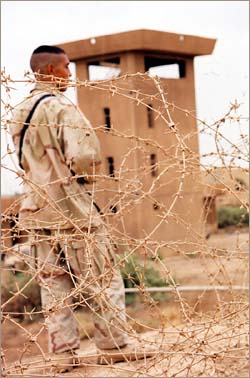 |
 |  |
|||||||
 |
Home | The Sunni Heartland | The Unexpected War | Paying the Price |
|||||||
|
The Sunni Heartland Tragic mistakes in al Anbar province
Al Anbar is the heartland of Iraq's Sunni Arab Muslims. A minority, they make up only twenty percent of Iraq's population, but they have been politically important for generations. The British favored them when creating modern Iraq in 1921; and so did Saddam Hussein, a Sunni Muslim himself. Two Iraqi presidents came from Anbar province, as did several prime ministers, hundreds of top military officers and thousands of wealthy businessmen. What happened in this province in the days and weeks following the war jump-started an armed opposition - an example of what went wrong in post- war Iraq. On the outskirts of Ramadi, the capital of the province, is the home of the Kerbeit family. They are one of the most powerful families of al Anbar, wealthy merchants before the war. Guests sit on high backed chairs that line the room. As a team of servants boils kettles of water over an open fire, Munther Kerbeit greets us. He's a young man in his mid-thirties, dressed in a traditional long white robe. Kerbeit chain-smokes as he quietly recounts how his family was torn apart in the days after the end of the war. "All my family were killed: I lost my brother, his wife, his five children, my sisters, her children, her husband," recounts Kerbeit, "I lost my mother and my cousin and their children. There was one baby, eight months - we had to collect her in pieces. We had to collect her in pieces, piece by piece." On April 11, two days after the fall of Baghdad, six precision-guided American bombs exploded in the family compound - killing 24 members of Munther Kerbeit's family. Next: Intelligence failures |
||||||||
